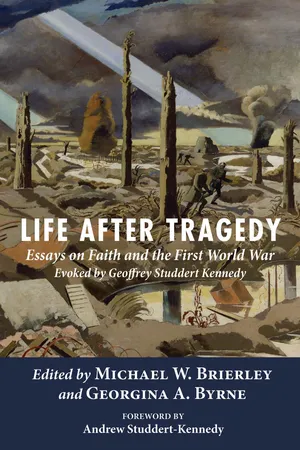![]()
Part I
Introduction
![]()
1
Reconsidering British Religion and the First World War
Michael F. Snape
From that moment all my religion died, after that journey all my teaching and belief in God had left me—never to return.
The centenary in November 2016 of the conclusion of the battle of the Somme, the bloodiest battle in British history and the most sanguinary of that worldwide conflict, produced the usual slew of media commentary on the First World War. The words above are those of Charles Bartram, a Yorkshire colliery worker speaking of his experiences on 1 July 1916, a day on which nearly 20,000 British soldiers died while trying to breach German defences in the rolling country of the department of the Somme. Prefacing a BBC Education report posted by Sean Coughlan on 17 November 2016, Bartram’s words encapsulate what many think ought to have happened to religious belief on the Somme, and in the larger cauldron of the war. Although he failed to develop Bartram’s story, or pursue the subject of faith in the trenches, Coughlan explained that Bartram’s striking testimony formed part of a huge collection of interviews conducted by Martin Middlebrook, a pioneering oral historian of the First World War, whose Somme material had now found its way into the archives of the Imperial War Museum. Middlebrook’s Somme collection, Coughlan went on, amounted to “more than 500 remarkable first-hand accounts of the World War One battle . . . , the ‘vast majority’ of which have never been seen before.” However, this is clearly not a claim that could be made for Bartram’s testimony, for it stood among eleven survivors’ statements that concluded Middlebrook’s classic account of 1 July 1916, The First Day on the Somme, which was published in 1971, and appeared as a Penguin paperback in 1984.
The compelling allure of the theme of war-induced, protest atheism was even more apparent in an article that was published in the Episcopalian magazine the Living Church the day before Coughlan’s story was posted. Here, under the title “The Great War’s Damage to the English Soul and Church,” Richard Kew, an Episcopalian priest and adoptive American, deplored a litany of woes that had been visited on “English” faith and society by the implicitly avoidable, self-inflicted calamity of the First World War: “That horrific war scarred the character, personality, and beliefs of the British people,” Kew claimed. “My assessment coming back to what is now home in the United States is that the English church, like the rest of the nation, is still wrestling with the consequences of a terrible demographic, psychic, spiritual, cultural, and philosophical catastrophe.” Significantly, even First World War veterans proved susceptible to the suggestive power of this myth. Ninety years after being wounded near Ypres, Harry Patch, the last surviving British veteran of the trenches, declared: “I left the army with my faith in the Church of England shattered. When I came home, I joined Combe Down church choir to try to get the faith back, but in the end I went because I enjoyed the music and had friends there, but the belief? It didn’t come. Armistice Day parade—no. Cassock and surplice—no.” However, this is hard to reconcile with Patch’s account (in the same volume) of an experience on the battlefield which Patch interpreted as his having been “allowed” to glimpse, for a moment, “the next world,” and which convinced him “from that day . . . that death is not the end.”
However satisfying such narratives might be, and however compelling a dramatic trope, stories of universal loss of faith speak more of the sensibilities of later generations than they do of the direct, contemporary experience of those who witnessed the war at first-hand. Impressive though Middlebrook’s endeavours certainly were, like Harry Patch his numerous interviewees spoke with the benefit (even handicap) of considerable hindsight, and even fifty years later, their views on the war often diverged, a fact illustrated by the nine other British survivors of the Somme quoted by Middlebrook at the end of his landmark book. And what an eventful and sobering experience that half-century had been: the Great Depression, the rise of Hitler, the Second World War, the advent of the atomic bomb, the Cold War, the Korean War, wars of decolonisation in Kenya, Malaya, and elsewhere, Suez, the Cuban Missile Crisis, and (more recently) the shocking spectacle of the first televised war unfolding in Vietnam. Well might one of Middlebrook’s British survivors have said: “One’s revulsion to the ghastly horrors of war was submerged in the belief that this war was to end all wars and Utopia would arise. What an illusion!”
But no less illusory are the popular and academic myths that have clustered around the First World War and those who waged it. As “Tubby” Clayton protested in response to the avalanche of semi-fictionalised and sensationalised “war books” that appeared in the late 1920s, “fact and fiction do not after all mix easily. . . . Abolish the rules of the game; and enterprise, unchecked by the ...
